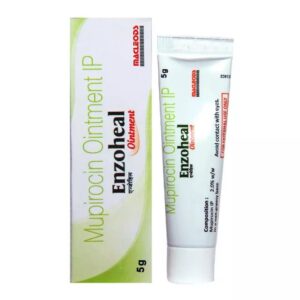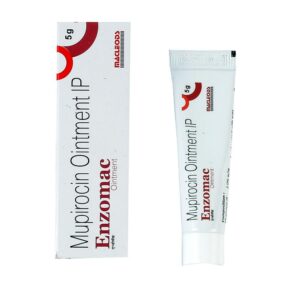MUPIROCIN + BROMELAIN
Mupirocin: Mupirocin is an antibiotic drug used to treat skin infections caused by bacteria. It works by interfering with the synthesis of proteins in the bacteria, leading to their death.
Mupirocin is primarily used to treat impetigo, a common skin infection caused by Staphylococcus aureus or Streptococcus pyogenes. It can also be prescribed for other skin infections, such as folliculitis and infected eczema.
The drug is available in various forms, including ointment, cream, and nasal ointment. The dosage and duration of treatment depend on the specific infection being treated. Generally, mupirocin ointment should be applied three times daily for about 10 days. Nasal ointment should be applied twice daily for 5 days to eradicate nasal colonization of methicillin-resistant Staphylococcus aureus (MRSA).
Mupirocin is generally well-tolerated with minimal side effects. Common side effects may include itching, stinging, or burning sensations at the site of application. Rarely, allergic reactions such as rash, hives, or swelling may occur. If these occur, medical attention should be sought immediately.
It is important to note that mupirocin should not be used in the eyes, and oral ingestion should be avoided as it is intended for external use only. It is also recommended to avoid applying mupirocin to large areas of broken skin or wounds.
Before using mupirocin, it is crucial to inform the healthcare provider about any existing medical conditions, allergies, or ongoing medications, including over-the-counter drugs or herbal supplements. This will help prevent potential drug interactions or contraindications.
Overall, mupirocin is an effective antibiotic medication commonly prescribed for skin infections caused by bacteria. It is essential to follow the healthcare provider’s instructions and complete the full course of treatment to ensure complete elimination of the infection.
Bromelain: Bromelain is a natural enzyme derived from the stem of pineapples. It is used primarily as a dietary supplement and is sometimes found in topical creams and ointments.
Bromelain has been traditionally used to reduce inflammation, swelling, and pain. It is believed to work by breaking down proteins and limiting the production of prostaglandins, which are compounds that contribute to the inflammatory process.
As a dietary supplement, bromelain is typically taken orally. The recommended dose can vary depending on the specific condition being treated. Generally, a typical dosage range is between 250 mg to 500 mg, taken two to three times a day. It is advisable to follow the instructions on the product label or consult a healthcare professional for proper dosage guidance.
Side effects of bromelain are generally mild but can include digestive issues such as nausea, diarrhea, and stomach discomfort. Allergic reactions are possible, although rare. It is important to note that bromelain can interact with certain medications, such as blood thinners, antibiotics, and anticoagulants, so it is crucial to consult a healthcare professional before starting any new supplement, especially if you are taking other medications.
Bromelain should not be used as a replacement for medical treatment of any specific condition. It is always recommended to seek medical advice to determine the appropriate use and potential benefits of bromelain.



